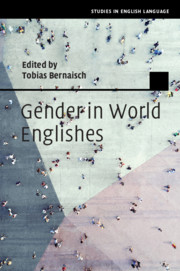Book contents
- Gender in World Englishes
- Studies in English Language
- Gender in World Englishes
- Copyright page
- Dedication
- Contents
- Figures
- Tables
- Contributors
- Chapter 1 Introduction
- Chapter 2 Localisation, Globalisation and Gender in Discourse-Pragmatic Variation in Ghanaian English
- Chapter 3 Sociolinguistic Variation in Intensifier Usage in Indian and British English
- Chapter 4 Tag Questions and Gender in Indian English
- Chapter 5 Hedges and Gender in the Inner and Expanding Circle
- Chapter 6 The Role of Gender in Postcolonial Syntactic Choice-Making
- Chapter 7 Social Constraints on Syntactic Variation
- Chapter 8 Linguistic Colloquialisation, Democratisation and Gender in Asian Englishes
- Chapter 9 Gender, Writing and Editing in South African Englishes
- Index
- References
Chapter 3 - Sociolinguistic Variation in Intensifier Usage in Indian and British English
Gender and Language in the Inner and Outer Circle
Published online by Cambridge University Press: 11 December 2020
- Gender in World Englishes
- Studies in English Language
- Gender in World Englishes
- Copyright page
- Dedication
- Contents
- Figures
- Tables
- Contributors
- Chapter 1 Introduction
- Chapter 2 Localisation, Globalisation and Gender in Discourse-Pragmatic Variation in Ghanaian English
- Chapter 3 Sociolinguistic Variation in Intensifier Usage in Indian and British English
- Chapter 4 Tag Questions and Gender in Indian English
- Chapter 5 Hedges and Gender in the Inner and Expanding Circle
- Chapter 6 The Role of Gender in Postcolonial Syntactic Choice-Making
- Chapter 7 Social Constraints on Syntactic Variation
- Chapter 8 Linguistic Colloquialisation, Democratisation and Gender in Asian Englishes
- Chapter 9 Gender, Writing and Editing in South African Englishes
- Index
- References
Summary
Research on gender differences in language use previously focused mainly on affluent, especially Western societies. The present chapter extends this research to acrolectal Indian English, a postcolonial variety of English, investigating how the use of intensifiers (e.g. very, really) is affected not only by the speakers’ gender, but also their age, the gender of the other speakers in the conversation and the formality of the context. Results show some parallels with Western varieties of English, in particular a tendency for women to use more intensifiers than men in informal contexts. However, Indian women modify their usage of intensifiers with respect to the formality of the context more than British women and men, while Indian men do so less than British women and men. In mixed-sex conversations, Indian women also converge with Indian men in their intensifier usage, while neither British women nor men do so. The more flexible use of intensifiers by Indian women may be a response to societal expectations regarding their linguistic behaviour, in order to avoid censure by society. British women likewise continue to be affected by such constraints, but much less so, while the linguistic behaviour of Indian and British men is subject to less criticism.
Keywords
Information
- Type
- Chapter
- Information
- Gender in World Englishes , pp. 47 - 68Publisher: Cambridge University PressPrint publication year: 2021
References
Accessibility standard: Unknown
Why this information is here
This section outlines the accessibility features of this content - including support for screen readers, full keyboard navigation and high-contrast display options. This may not be relevant for you.Accessibility Information
- 1
- Cited by
